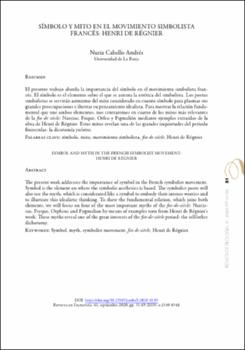Símbolo y mito en el movimiento simbolista francés: Henri de Régnier
Autor
Cabello Andrés, NuriaFecha
2020Resumen
El presente trabajo aborda la importancia del símbolo en el movimiento simbolista francés. El símbolo es el elemento sobre el que se asienta la estética del simbolista. Los poetas
simbolistas se servirán asimismo del mito considerado en cuanto símbolo para plasmar sus
grandes preocupaciones e ilustrar su pensamiento idealista. Para mostrar la relación fundamental que une ambos elementos, nos centraremos en cuatro de los mitos más relevantes
de la fin de siècle: Narciso, Psique, Orfeo y Pigmalión mediante ejemplos extraídos de la
obra de Henri de Régnier. Estos mitos revelan una de las grandes inquietudes del periodo
finisecular: la dicotomía yo/otro. The present work addresses the importance of symbol in the French symbolist movement.
Symbol is the element on where the symbolic aesthetics is based. The symbolist poets will
also use the myth, which is considerated like a symbol to embody their intense worries and
to illustrate this idealistic thinking. To show the fundamental relation, which joins both
elements, we will focus on four of the most important myths of the fin-de-siècle: Narcissus, Psyque, Orpheus and Pygmalion by means of examples torn from Henri de Régnier’s
work. These myths reveal one of the great interests of the fin-de-siècle period: the self/other
dichotomy.





